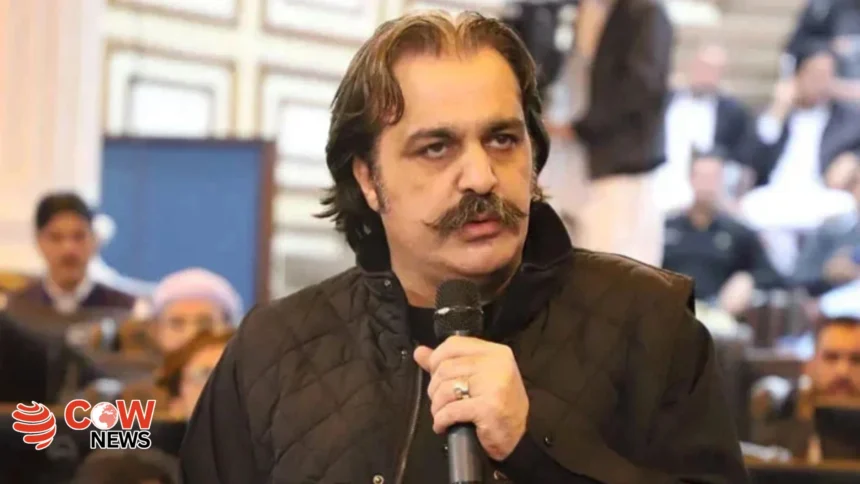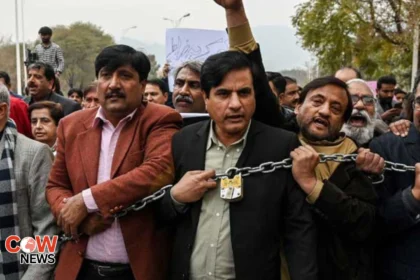In a candid discussion, Khyber Pakhtunkhwa’s Chief Minister, Ali Amin Gandapur, stated that former Prime Minister Imran Khan is ready to forgive everyone and is willing to engage in dialogue with all stakeholders for the betterment of Pakistan. Speaking at a high-level meeting, Gandapur reiterated that any actions that weaken Pakistan would not be supported, underlining his commitment to national unity and the fight against terrorism.
Gandapur, who is a senior leader of the Pakistan Tehreek-e-Insaf (PTI) party, discussed various political and security matters, stressing that the current government must ensure a unified stance against terrorism. He called for a comprehensive strategy to address the issues of extremism and violence in the country, claiming that the lack of public trust has made dealing with these challenges significantly harder. However, he emphasized that the nation must come together to confront these issues effectively.
Gandapur mentioned that Imran Khan, the founder of PTI, is willing to forgive all and engage with everyone for the greater good of the country. “Imran Khan is ready to forgive all those who may have been involved in past political conflicts. His focus is on Pakistan’s future, and he is open to talking to everyone for the sake of the country,” said Gandapur.
He highlighted that Khan’s approach remains consistent with the need for national dialogue and reconciliation. “If something weakens Pakistan, Imran Khan is not in favor of it,” Gandapur added, reaffirming that Khan has expressed his readiness to resolve differences in a peaceful and constructive manner.
Discussing national security, Gandapur emphasized the importance of overcoming terrorism and extremism to ensure long-term stability in the country. He acknowledged that the National Security Committee (NSC) meeting, which had taken place earlier, was merely a presentation that was part of ongoing discussions on security matters. He noted that the NSC meeting revealed a lack of confidence and clarity, particularly with regard to the stolen mandate, and questioned the transparency of the current political processes.
Gandapur revealed that during the meeting, he had asked Maulana Fazlur Rehman, the leader of the Jamiat Ulema-e-Islam (JUI-F), two specific questions, which he claimed were left unanswered. The questions pertained to Rehman’s contradictory statements regarding the ousting of Imran Khan’s government and the claims about a stolen mandate. Gandapur pointed out that the lack of clear answers only added to the political confusion.
He further discussed the need for political stability in Pakistan, asserting that the country could not move forward while political leaders, including Imran Khan, remain imprisoned. “Until Imran Khan is in jail, there can be no political stability in this country,” he argued, suggesting that the country must work towards resolving political disputes for the sake of its future.
On the issue of counterterrorism operations, Gandapur reflected on past military operations, expressing concern that they had often led to more harm than benefit. He argued that many civilians, who were not involved in terrorism, had been negatively affected by these operations, and public trust in the government’s ability to handle security had diminished. Gandapur also emphasized the importance of keeping promises made to the public in order to rebuild trust.
Regarding security in Pakistan’s border regions, Gandapur emphasized that maintaining good relations with Afghanistan is essential for peace and security in the region. He pointed out that without stable ties with Afghanistan, Pakistan would not be able to ensure lasting peace. Referring to the significant investments made in fencing the border, he criticized the gaps in the border security measures, mentioning that the fencing had been damaged in several places, facilitating smuggling, terrorism, and other illegal activities. “We have spent billions on the border fencing, but there are places where the fencing has been torn down, allowing terrorists and smugglers to cross freely,” Gandapur remarked.
The Chief Minister stressed that security cannot be achieved solely through large military operations. Instead, he proposed that Pakistan’s security forces focus on strengthening border security and maintaining internal law and order. He argued that ensuring the safety of the border is key to protecting the country from external and internal threats.
Gandapur underscored the significance of public trust in the fight against terrorism. He noted that without the support of the people, it would be difficult to win this battle. “The people are everywhere. Without them, no one can establish a safe haven or headquarters. Even if you take action on the roads, the people must stand with you,” he explained. He emphasized that the government must restore public confidence to effectively combat terrorism.
Addressing criticism about his government’s law and order situation, Gandapur responded to claims from political opponents, such as the Governor of Khyber Pakhtunkhwa, who had questioned the region’s security. He pointed out that while the provincial government had successfully maintained law and order in Khyber Pakhtunkhwa, other regions, like Balochistan, faced serious security challenges under the current administration. “The opposition criticizes me, but when their own province struggles with law and order, they remain silent,” Gandapur stated, referring to the situation in Balochistan.
He also compared the law enforcement capabilities of different provinces, particularly criticizing the Punjab police for their inefficiency. He pointed out that his administration had made significant strides in improving law and order in Khyber Pakhtunkhwa, despite limited resources. “If Punjab’s police were in my place, they would not have been able to handle the situation here,” he said.
Gandapur addressed a longstanding issue in Pakistan’s counterterrorism strategy: the distinction between “good” and “bad” Taliban. He criticized the policy that had allowed some factions of the Taliban to operate with relative impunity, while the state struggled to deal with others. “The concept of good and bad Taliban has been a flawed policy. People have lost trust in the government because of this,” he remarked. He further revealed that some members of the Taliban were involved in extortion, smuggling, and even kidnappings for ransom.
He acknowledged the presence of local police forces in Khyber Pakhtunkhwa and highlighted their successful efforts in fighting terrorism. He pointed to a recent attack in Karak, where local residents, alongside police officers, fought back against terrorists, as a testament to the trust and confidence the people had in their security forces.
In his concluding remarks, Gandapur reiterated that despite all the challenges, Pakistan’s future lies in unity and collective action. He mentioned that the establishment, the political system, and all institutions must work together to ensure the country’s stability and security. “Anyone who retreats from this struggle will be exposed as someone who does not have Pakistan’s best interests at heart,” he warned.
Gandapur expressed hope that, with the right policies and the support of the people, Pakistan would overcome its current challenges. “Inshallah, we are very close to achieving our goal,” he said, assuring the nation that the government remains committed to tackling terrorism, restoring political stability, and safeguarding Pakistan’s future.
Chief Minister Ali Amin Gandapur’s remarks provided a candid view into the political and security challenges facing Pakistan. His call for national unity, public trust, and decisive action against terrorism resonated with many who believe that only a collective effort can bring the country back from the brink of crisis. As Pakistan grapples with multiple challenges, including terrorism, political instability, and economic issues, Gandapur’s vision of a united and secure nation offers hope for a better future.







